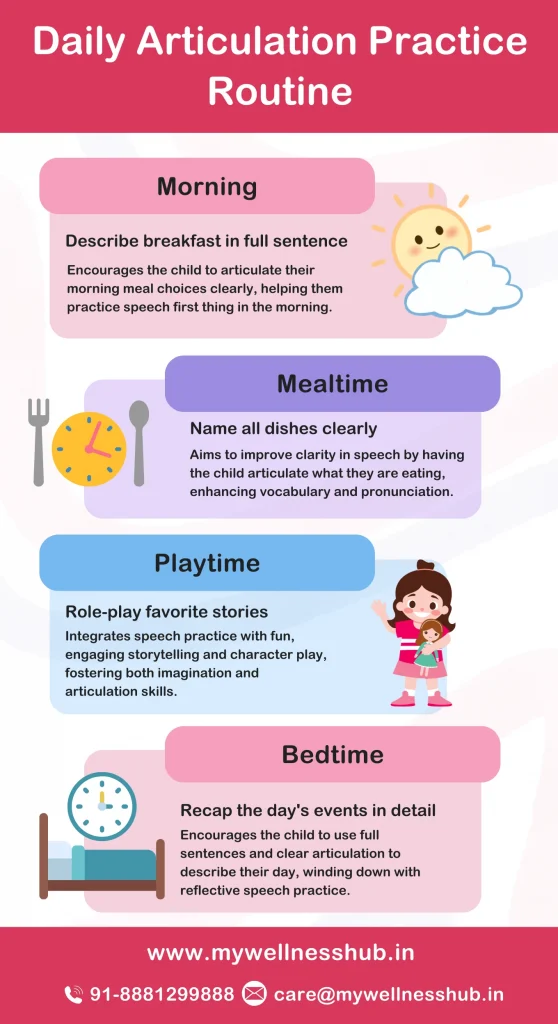Top 10 Tips for Adding Articulation Practice into Daily Routines
By Rajini D
Last Updated: January 9, 2025
Integrating articulation practice into daily routines can significantly enhance your child’s communication skills. By seamlessly incorporating speech exercises into everyday activities, children learn to speak more clearly and confidently. Each day offers numerous opportunities, from discussing daily events to playful interactions, where your child can practice and improve. This not only makes learning fun but also embeds essential speech skills within their natural environment. Stay tuned for simple, engaging ways to weave articulation practice into your family’s routine, helping your child master the art of clear communication effortlessly.

Understanding Articulation Practice
Articulation practice helps children learn how to pronounce sounds clearly, which is key for good communication. It involves using the tongue, lips, and palate to make sounds correctly. This skill is an essential part of articulation practice daily routines because it affects how well a child can talk with others, answer questions, and express their feelings. Integrating these practices into daily routines ensures that children consistently work on improving their articulation, enhancing their ability to communicate effectively in everyday interactions.
When children work on their articulation regularly as part of their daily life, they get better at speaking clearly without it feeling like a chore. This helps them become more confident and effective in their everyday interactions.
Know more: Speech Sound Disorders: Causes, Treatment and Strategies
The Benefits of Daily Articulation Exercises
Incorporating articulation exercises into your child’s daily routine, as part of articulation practice daily routines, can lead to significant improvements in their speech and overall confidence. Regular practice helps refine clarity and pronunciation, which are essential for effective communication. Let’s delve into how these exercises can make a real difference in their ability to articulate clearly and confidently every day.
Improved Clarity and Pronunciation: Daily articulation practice helps children learn how to form sounds correctly, reducing speech misunderstandings. Over time, this practice helps in articulating words more clearly, making conversations with peers and adults smoother and more comprehensible.
Boosted Confidence: As children notice their speech improvements, their confidence in speaking up and participating in conversations increases. This newfound confidence can spill over into other areas of their life, such as school performance and social interactions.
Enhanced Learning Abilities: Clear speech is not just about talking. It also affects how well children can engage with and absorb new information. Articulation practice supports academic skills, including reading and writing, by reinforcing phonetic awareness and the ability to differentiate between sounds.
Tip 1: Morning Routine Speech Drills
Starting the day with simple speech exercises can set a positive tone for your child’s communication throughout the day. As part of articulation practice daily routines, here are a couple of easy morning activities to seamlessly incorporate articulation practice and enhance your child’s speech development.
Morning Greeting Rituals: Encourage your child to say good morning using full sentences. For example, “Good morning, Mom! How did you sleep?” This not only practices speech but also fosters a warm, communicative environment.
Weather Descriptions: As part of getting ready, ask your child to describe the weather outside. This can range from simple statements like “It is sunny” to more complex descriptions depending on their ability level. It’s a practical way to practice articulation and expand vocabulary in a real-world context.
Daily Articulation Activities Schedule
| Time of Day | Activity | Description |
|---|---|---|
| Morning | Breakfast Talk | Describe breakfast items using full sentences. |
| Mealtime | Meal Descriptions | Articulate all dishes clearly during meals. |
| Playtime | Story Role-Playing | Engage in role-playing games with clear speaking. |
| Chores | Sorting Game | Name and sort items during chores, like laundry. |
| Bedtime | Night Recap | Recap the day’s events using detailed descriptions. |
Tip 2: Articulation During Meal Times
Meal times provide a great opportunity to practice speech sounds in a relaxed, engaging setting. Here’s how you can turn mealtime into fun articulation sessions:
Repeating Meal Choices: Have your child clearly articulate what they want to eat. Encourage them to form complete sentences, such as “I would like some carrots and rice, please.”
Table Games for Clear Speaking: Introduce games like ‘I Spy’ during mealtime, focusing on articulating sounds clearly. For instance, “I spy something red that starts with ‘A’ (apple).” This game not only makes articulation practice fun but also sharpens their observation and descriptive skills.
Tip 3: Incorporating Practice with Daily Chores
Chores might seem lacking interest, but they’re actually perfect opportunities for articulation exercises. Here’s how you can turn everyday tasks into beneficial speech practice sessions:
Matching Laundry Items: As you and your child sort the laundry, ask them to name each item as they pair socks or fold shirts. For instance, “Can you find the match for this blue sock?” Encourage them to respond in full sentences to practice their articulation skills.
Naming Groceries: During grocery shopping or while putting away groceries, have your child articulate the names of different foods. You can make it a game by asking them to describe attributes of the grocery items, such as “Tell me what you can make with tomatoes and lettuce.”
Tip 4: Story Time Enhancements
Story time is not just for imagination; it’s also an excellent chance to practice articulation:
Focus on Specific Sounds: Choose books that feature words with sounds your child needs to practice. For example, if they struggle with the “s” sound, pick stories with lots of s-words.
Interactive Reading: Engage your child by pausing to let them articulate certain words or phrases in the story. Encourage them to mimic the characters’ voices to make it more fun and engaging, which can improve their speech clarity and fluidity.
Also read: Boost Kids Storytelling Skills: Engage and Educate at Home
Tip 5: Playtime Speech Enrichment
Playtime offers a natural, enjoyable setting for speech practice, making it easy to integrate articulation exercises:
Role-Playing Games: Whether it’s playing house, doctor, or store, role-playing games are great for speech practice. Encourage your child to articulate their lines clearly, using full sentences and clear speech.
Singing Songs: Music and songs are terrific tools for articulation. Sing along with your child and emphasize the pronunciation of words and sounds within the songs. This can help with rhythm and speech patterns, making articulation practice a joyous activity.
Tip 6: Use of Technology in Articulation Practice
Incorporating technology into articulation practice can be both fun and effective. Here’s how you can leverage digital tools to enhance your child’s speech skills:
Recommended Apps: There are several apps designed specifically for speech therapy that can make articulation practice engaging. Apps like “Autism Basics” provide interactive activities and feedback, which are key for mastering pronunciation.
Productive Tech Use: Set specific times and goals for using technology in speech practice. For example, dedicate 10-15 minutes to a speech app during your child’s daily screen time. Monitor their progress and ensure the activities focus on sounds they need to improve.
Tip 7: Outdoor Activities for Clear Speech

Outdoor activities not only provide a change of scenery but also excellent opportunities to practice loud and clear articulation as part of articulation practice daily routines. Here are some fun outdoor games that can help enhance your child’s speech clarity, integrating essential speech skills into everyday play.
Scavenger Hunts: Organize scavenger hunts where your child needs to articulate the names of found items clearly. For instance, ask them to find something that starts with a specific sound or letter and describe it to you.
Also Read: Top 8 Engaging Articulation Games for Effective Speech Therapy
Nature Walks with Descriptive Tasks: During nature walks, challenge your child to describe the scenery, what they see, hear, or smell. Encourage them to use full sentences and clear articulation, turning a simple walk into a productive speech exercise.
Tip 8: Social Interaction and Articulation
Encouraging clear communication during social interactions is key to reinforcing articulation skills in real-world settings as part of articulation practice daily routines. Here’s how you can support your child during playdates and family gatherings to enhance their speech development consistently.
Encourage Speaking Turns: During social events, give your child plenty of opportunities to speak. Encourage them to share stories or explain games to others, which promotes clear articulation.
Feedback and Correction: Provide gentle, constructive feedback in a way that is supportive and encouraging. If your child struggles with certain sounds, discreetly model the correct pronunciation and encourage them to try again, ensuring the feedback is positive and motivating.
Tip 9: Bedtime Routines for Speech Practice
Bedtime can be an ideal time for calm, focused speech practice. Here are some ways to incorporate articulation exercises into nighttime routines:
Recapping the Day: Have your child recount the day’s events. This not only practices their narrative skills but also allows them to articulate in a quiet, undistracted environment.
Prayers or Nighttime Stories: If your family practices prayers, encourage your child to say them aloud. Alternatively, select bedtime stories that focus on their target sounds. Read together, with your child repeating phrases or dialogue to practice articulation.
Conclusion
Integrating articulation practice into everyday activities is crucial for your child’s speech development. By making these exercises part of daily routines, you help your child speak clearer and with confidence. Remember, consistency and patience are key. Every day is a new opportunity to practice and progress. At Wellness Hub, we provide helpful resources and tips to make this journey engaging and effective. For more support and ideas, check out our articulation tools. Keep cheering your child on—your encouragement is vital as they learn to express themselves more clearly every day!
Frequently Asked Questions:
1. What is articulation practice?
Articulation practice involves exercises aimed at helping children learn how to pronounce sounds correctly. This practice is crucial as it enhances the clarity of their speech, ensuring they can communicate their thoughts and needs effectively.
2. Why is daily articulation practice important for children?
Engaging in articulation practice daily helps reinforce proper speech patterns, improves vocal clarity, and boosts children’s confidence in their communication abilities. Regular practice also helps solidify the muscle memory needed for clear speech.
3. How can I include articulation practice in my child’s morning routine?
Incorporating articulation practice into your child’s morning routine can be as simple as having them articulate what they plan to wear or describing their breakfast choices. These activities help wake up their speech muscles early in the day, setting a precedent for clear communication throughout the day.
4. What are some articulation activities for meal times?
Meal times can be used for articulation activities by encouraging your child to request dishes using complete sentences, or describe the taste, color, and texture of their food. This not only practices articulation but also enhances their sensory descriptions.
5. Can chores be used for articulation practice?
Absolutely! Chores provide a natural context for articulation practice. For example, while organizing their room, children can practice naming objects or describe their actions, such as “I’m folding the red shirt” or “I’m sweeping the floor,” which helps in practicing clear articulation.
6. How can story time improve my child’s articulation?
Story time can be made interactive by focusing on books that contain sounds or words your child finds challenging. Encourage your child to read aloud, articulate character dialogues, or repeat catchy phrases, which enhances both their articulation and reading skills.
7. What role does technology play in articulation practice?
Technology, when used correctly, can significantly enhance articulation practice through engaging, interactive apps that provide auditory and visual feedback. Apps designed for speech therapy often include games and exercises that make practicing fun and effective.
8. Which outdoor activities are good for articulation practice?
Outdoor activities such as playing ‘I Spy’ during a walk or organizing a treasure hunt with clues can encourage your child to use clear articulation as they describe their findings or ask questions. These activities make articulation practice enjoyable and socially engaging.
9. How can I provide effective feedback on my child’s articulation progress?
Providing effective feedback involves being specific about what sounds or words they pronounced well and gently correcting the ones they didn’t. Regular feedback sessions should be encouraging and focused on progress, using positive reinforcement to motivate continued practice.
10. What should I do if I don’t see immediate improvement in my child’s articulation?
Speech development is a gradual process that varies for each child. If improvements are slow, continue supporting your child with daily practice, and consider consulting a speech therapist for additional strategies. Patience and persistence are key in helping your child develop better articulation skills.
About the Author:
Rajini Darugupally
M.Sc., Speech-Language Pathologist (9+ years of experience)
Rajini is a passionate and dedicated Speech-Language Pathologist with over 9+ years of experience, specializing in both developmental speech and language disorders in children and rehabilitation in adults. Currently, at Wellness Hub, she thrives in a team environment that values innovation, compassion, and achieving results for their clients.
Book your Free Consultation Today
Parent/Caregiver Info:
Client’s Details:
* Error Message









